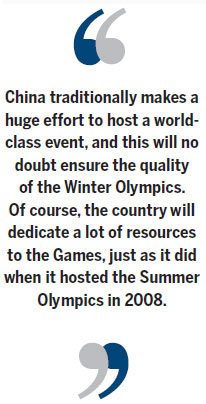Olympics redux: What it will mean
Updated: 2015-08-21 08:16
By He Jun(China Daily Europe)
|
|||||||||||
Beijing's plan for the 2022 Winter Games is impressive, even if it is not a copy of 2008
On July 31, when the President of the International Olympic Committee, Thomas Bach, announced that Beijing had become the host of the 2022 Winter Games, the Chinese capital made history by becoming the first city to be awarded both the summer and winter Olympics.
According to the final count, Beijing won by a narrow margin, getting 44 nods from IOC members against 40 for Almaty in Kazakhstan, with one abstention.

Beijing's narrow margin, even though its credentials are better than those of Almaty for hosting the Games, show that Beijing's relationships with other countries are very intricate.
A video speech by President Xi Jinping played during Beijing's final presentation to the IOC members and Vice-Premier Liu Yandong's live speech demonstrated China's commitment and passion for the Games.
Beijing Mayor Wang Anshun, also the 2022 bid committee president, promised Beijing would offer the world an outstanding Winter Games. He invited people around the world to celebrate the 2022 New Year in Beijing while enjoying the Winter Olympics.
China traditionally makes a huge effort to host a world-class event, and this will no doubt ensure the quality of the Winter Olympics. Of course, the country will dedicate a lot of resources to the Games, just as it did when it hosted the Summer Olympics in 2008.
The Chinese capital and its co-bidder Zhangjiakou have now entered the 2022 Winter Olympics countdown. However, after the experience of the 2008 Summer Olympic Games the Chinese people seem less excited about Beijing's win this time. They have a more sober analysis of what it means for China to host the Olympics this time, and are no doubt thinking about what changes the Games will bring to Beijing and Zhangjiakou.

First, how much will it cost to host the Olympics? We all know that hosting the Games is expensive - Beijing invested $43 billion to host the 2008 Beijing Olympic Games, setting an Olympics record. The Chinese capital promised to host an athlete-centered, sustainable and economical Games this time.
In its bid, Beijing proposed a $1.56 billion event budget and a $1.51 billion construction budget, including competition and non-competition venues. Zhou Xing, the financial and marketing officer for the Beijing 2022 team, told IOC members that out of the $1.51 billion venue construction budget, 65 percent is from non-government investment. For example, all three Olympic villages are made possible thanks to such funds. When the Games are over, the villages in Beijing and Chongli will be sold as commercial properties. The other village in Yanqing will serve as a hotel.
"The Chinese government is strongly backing Beijing's bid for the Winter Olympic Games," says Yu Weiping, China's vice-finance minister and a leading member of the bid committee. "We have promised to provide financial support to ensure the smooth operation of the Games."
Clearly, the Chinese government will provide sovereign credit endorsement for the Winter Games. I hope China does not repeat Russia's experience - the initial budget for hosting the Sochi Winter Olympics last year was $12 billion, but the final cost was as high as $51 billion.
Second, how much money can the Games earn for the host country? Do not count on the Winter Games to make money. The financial audit result published by the Organizing Committee of the Beijing Summer Olympic Games in June 2009 found that the committee earned 20.5 billion yuan ($3.3 billion), and spent 19.3 billion yuan, so the net profit was just over 1 billion yuan. But apparently that did not account for other inputs around China that contributed to the Games.
The host of the Olympics would find it hard to balance the books but instead is expected to reap other benefits.
Third, what changes will the Winter Olympics bring to Beijing and Zhangjiakou? In the case of the 2008 Games, the capital's urban construction benefited most, laying the foundation for its next round of urban sprawl and expansion.
Against the background of the integration of the Beijing-Tianjin-Hebei region and the devolving of some of the capital's functions to the other regions, it is estimated Beijing will not build many new facilities for the 2022 Games, but will renovate and supplement existing venues.

Beijing's air quality is likely to benefit most from the Games. The capital has vowed to cut the density of tiny, and potentially most harmful, PM2.5 particles by 45 percent by 2020, meaning all people living in the city will benefit from the reduction of air pollution.
Urban construction and the city environment in Zhangjiakou are expected to improve greatly due to the Games. Transport and supporting infrastructure and sports venues in counties like Beijing's Yanqing and in Zhangjiakou and nearby places will improve a lot because of the Games.
Fourth, what will the Winter Olympics bring to China? Large international events such as the Olympics and world expos are very tempting to emerging markets like China - in addition to economic benefits, hosting such events brings the host country international influence and opportunities to promote its image worldwide, which is what political leaders like to see.
Up to 2022, the Winter Olympic Games may be the only opportunity for China to host such a large global sporting event. To some extent, China's need to host the Games is greater than the Games' need to come to China. Especially during the current special period of downward economic pressure, and upgrading and restructuring of industry, the Winter Games is a massive project that will need continuous investment and construction for seven years.
Fifth, how will Beijing and Zhangjiakou divvy up the influence gained from the Games? Comparing Beijing to its co-host, Zhangjiakou, the capital naturally seems like a big brother, which means the two will not be equally influential and the glory of the Winter Olympic Games will mostly shine on Beijing.
However, in the context of the integration of Beijing, Tianjin and Hebei province, it is clear Beijing cannot enjoy all the benefits of the Games, and will take the opportunity to share some resources with Zhangjiakou to assist its development. This is also what the central government would like to see.
With the Olympic countdown having now begun, Beijing and Zhangjiakou are making their preparations for seven years of construction. The impact of the Winter Games on Beijing, Zhangjiakou and China as a whole will become gradually clear.
The author is a senior researcher with Anbound Consulting, a think tank for public policy. The views do not necessarily reflect those of China Daily.
(China Daily European Weekly 08/21/2015 page12)
Today's Top News
No cyanide detected from Tianjin river section with fish deaths
Greek PM to resign, seek snap election in September
Britain to reopen embassy in Tehran this weekend
Chemical plants to be relocated in blast zone
IMF to extend current SDR basket until September 2016
China-Russia joint military drill no reason for concern
Rebels in Ukraine's Donetsk plan referendum on joining Russia: media
Man in yellow shirt is Bangkok bomber: Police
Hot Topics
Lunar probe , China growth forecasts, Emission rules get tougher, China seen through 'colored lens', International board,
Editor's Picks

|

|

|

|

|

|






